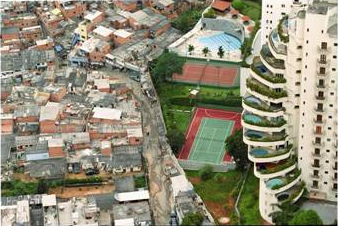This picture, provided by Columbia University, shows how an apartment building for the wealthy in Brazil overlooks a favela. Apparently, the apartment building is called Paradise City (Paraisópolis). What it shows is that there is no clearcut division between “poor” and “rich” countries and that within one country poor and wealthy people can live literally side by side. What it does not tell us is how happy, healthy and educated these people are. |
Is this a good thing or a bad thing? Can poor and rich be defined by income and wealth alone or do other variables matter more? How does all this relate to happiness? And who is responsible for making sure the world ‘works’ and allows all of its citizens to live well? Is social development at odds with business? Can politicians make us happy?
As I mention in my Vision Statement I believe that we are all responsible for developing the world into the right direction, economically, socially and environmentally. This requires all of us to feel responsible: individuals must take care of their neighbours and communities; businesses must analyse and optimise their social and environmental impact; and politicians must put their constituencies’ welfare above political and personal gain.
This Blog will discuss a variety of sustainability and development themes I come across in my professional and personal life, be it when working with women in rural areas of Africa on demanding better healthcare from the authorities; when teaching students from around the globe on sustainable business and management for the future; when writing a report about politics and happiness; when helping start-ups work out their social impact; or when discussing my own work-life balance with family and friends.
I hope you enjoy this blog - please do comment and share widely! Thank you :)


 RSS Feed
RSS Feed